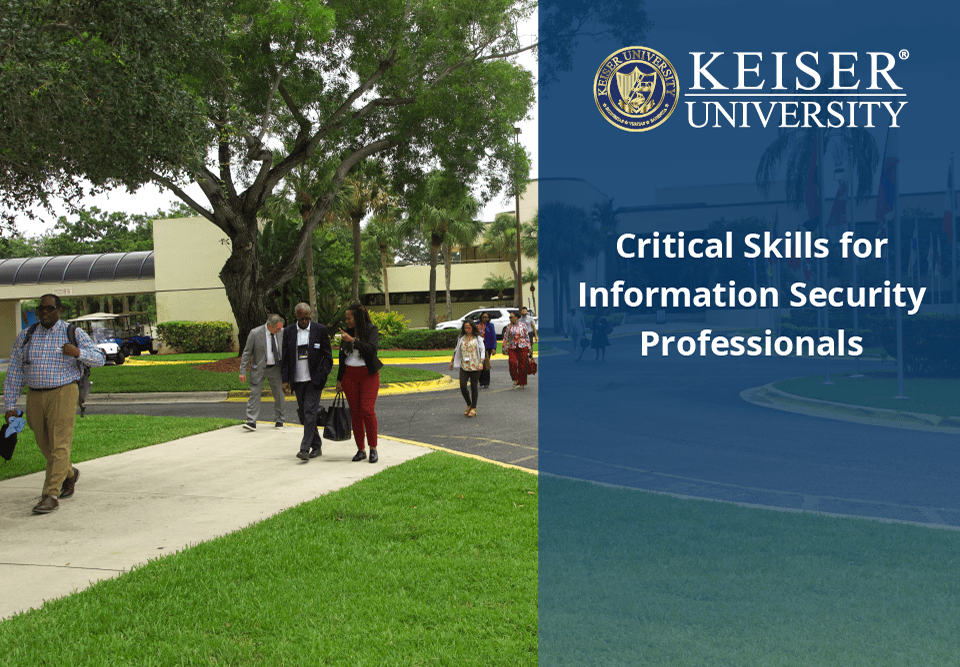Cybercriminals work relentlessly to access private systems and the sensitive data they contain. As a result, information security (InfoSec) is an ever-evolving field. With threats growing in complexity and technology advancing rapidly, InfoSec professionals must remain vigilant — equipped with a broad range of technical, analytical, and interpersonal skills to build impactful and resilient careers.
Why Skill Development Matters in Information Security
In today’s digital-first world, nearly every government agency and private organization depends on IT systems to manage operations and safeguard data. Unfortunately, this reliance makes them prime targets for cyberattacks. Microsoft estimates that 600 million cyberattacks globally every day, and according to the U.S. Government Accountability Office, these attacks are becoming more frequent, costly, and sophisticated. Without skilled InfoSec professionals, organizations risk catastrophic breaches that can damage reputations, drain finances, and compromise national security.
The Rising Demand for Skilled InfoSec Professionals
Due to the increasing reliance on digital systems and opportunities for cybercriminals, the demand for skilled information security professionals is expanding just as quickly. The U.S. Bureau of Labor Statistics (BLS) projects a 33% growth rate for information security analysts between 2023 and 2033 — far outpacing the 4% average across all occupations.
The High-Stakes Nature of Cyber Threats
While some cyber incidents may seem minor, the consequences of large-scale attacks are severe. Threats can impact individuals, corporations, and even entire nations. Cyberattacks can impact individuals, businesses, organizations, economies and governments.
Critical infrastructure sectors at risk include:
- Chemical
- Commercial facilities
- Communications
- Dams
- Defense
- Emergency services
- Energy
- Financial services
- Food and agriculture
- Government services
- Healthcare
- Manufacturing
- Transportation
- Water systems
Such attacks can:
- Threaten national security.
- Disrupt essential services.
- Cause significant financial losses.
- Damage reputations.
- Result in the theft of intellectual property.
- Expose personal and financial data.
- Steal intellectual property.
- Inflict financial and reputational harm.
As technology evolves — from AI and deepfakes to the Internet of Things (IoT) — so too do the tools of cybercriminals. InfoSec professionals must constantly adapt to stay one step ahead.
Technical Skills for Information Security Professionals
A strong technical foundation is the backbone of cybersecurity. Key competencies include:
Network Security and Cloud Security
Securing physical and virtual systems and networks with firewalls, VPNs, intrusion prevention, access control, segmentation, and encryption. This includes the use of tactics like:
- Firewalls
- Intrusion detection and prevention systems
- Virtual private networks
- Access control
- Segmentation
- Encryption
Programming and Scripting
Both programming (writing complex, secure codes for software) and scripting (automating security tasks) can be used to improve security with customized solutions, cybersecurity infrastructure, data analysis and the development of secure software and applications.
Incident Response
InfoSec professionals use incident response skills to create an organized process for detecting, managing and recovering from cybersecurity incidents like cyberattacks and data breaches.
Cryptography
Cryptography encodes information — making it unreadable to unauthorized individuals. Encryption knowledge helps facilitate secure communication and data storage.
Malware Prevention and Detection
InfoSec professionals establish strategies and new technologies to help safeguard data and systems from viruses and other malicious software. They also develop systems designed to detect malware.
Operating Systems
In information security, operating systems form a foundation for security and software management. Creating and maintaining secure operating systems helps to shore up a system and network against attacks and other vulnerabilities.
Threat Knowledge
Also called threat intelligence, threat knowledge encompasses the awareness and understanding of current and potential cyber threats. Knowing the types of potential attacks and being aware of vulnerabilities enhances risk management, threat detection and threat prevention.
Regulatory Guidelines
Several laws, regulations and industry standards have been put in place to protect sensitive data and crucial systems from cyberattacks. Information security professionals should be aware of these requirements to maintain compliance while safeguarding data.
Analytical and Strategic Skills
Beyond technical expertise, InfoSec professionals must think critically and strategically.
Critical Thinking and Problem-Solving
Cybersecurity experts use critical thinking, analytical skills and problem-solving on a daily basis. They must observe situations, gather data and analyze complexities to identify threats and develop strong solutions. With critical thinking skills, InfoSec professionals can better anticipate issues — acting proactively, rather than only reacting after a breach has occurred.
Risk Assessment and Management
Information security professionals use their critical and analytical thinking skills to assess potential risks, identify vulnerabilities and anticipate potential threats. They can then bolster risk management strategies by implementing preventative measures.
Understanding of Security Frameworks
Also called information security management systems (ISMS), security frameworks lend structure to information security protocols. They include a set of guidelines, policies and procedures for mitigating and managing cybersecurity threats. InfoSec professionals should have a strong command of common security frameworks, such as the National Institute for Standards and Technology (NIST) and ISO/IEC 27001.
Forensics and Incident Response
Information security professionals are tasked with preparing for cyberattacks; this includes understanding how to respond quickly and effectively to attacks as well as investigating incidents that have already occurred to better understand what happened.
Soft Skills for Information Security Professionals
Soft skills include competencies that are not necessarily directly related to the technical skills for cybersecurity and InfoSec. However, they are still vital to succeeding in a professional capacity. Important cybersecurity soft skills include:
Communication and Attention to Detail
Skilled InfoSec professionals are able to communicate clearly and effectively in order to build awareness, facilitate quick action and build trust with stakeholders. Additionally, paying attention to detail in their job ensures that no stone is left unturned and no vulnerabilities are overlooked.
HAdaptability and Continuous Learning
With cybercriminals constantly improving and looking for new angles and vulnerabilities, InfoSec professionals must do the same. This requires them to be adaptable and flexible. Working in this industry means you will never be done learning, too, as keeping up with the latest advancements and emerging technologies is vital to staying ahead of the curve.
Collaboration and Teamwork
Cybersecurity professionals collaborate with other InfoSec experts, plus the team of professionals with whom they work — pooling their talents for optimal results while also training individuals who are not tech experts.
Composure Under Pressure
Working in InfoSec entails working in a virtual battlefield where systems that hold valuable information are constantly under threat of attack. In the event of an attack, time is of the essence. The quicker you respond, the less damage will be done. This requires professionals to stay focused and calm so they can respond quickly and effectively to tense situations.
AI Security Skills for Information Professionals
As artificial intelligence becomes increasingly integrated in cybersecurity, InfoSec professionals will draw from skills and knowledge in AI more than ever.
AI-Powered Security Solutions
Cybersecurity professionals should be aware of the rise of security solutions powered by AI — understanding their abilities, limitations and potential vulnerabilities.
Utilize AI-Powered Learning Platforms
They should be prepared to help facilitate the safe utilization of learning and training systems powered by AI. In addition, cybersecurity professionals can utilize these platforms for their own training.
AI-Enabled Talent Acquisition Tools
AI is also revolutionizing talent acquisition. InfoSec professionals’ understanding of these systems can allow them to better tailor their talent search as well as their resumes.
Cross-Functional Collaboration
InfoSec professionals will increasingly lean on cross-functional collaboration with artificial intelligence experts to leverage machine learning, AI-powered automation and enhanced security solutions.
AI-Driven Data Analysis and Predictive Modeling
InfoSec experts can use AI to run predictive models and analyze data for:
- Penetration testing
- Vulnerability detection
- Breach detection
- Risk management
Prompt Injection and Mitigation
Cybersecurity professionals working in AI should be prepared to detect and respond to prompt injection attacks designed to manipulate large language models with prompts that can override their developer-designed instructions.
Certifications That Validate Your Skills
It is possible to be an InfoSec expert without any formal training. However, to succeed professionally in the industry, you must possess validated credentials. Earning certain certifications can help demonstrate and prove your knowledge, expertise and abilities.
CompTIA Security+
This entry-level professional cybersecurity certification is globally recognized and demonstrates essential skills in IT security.
Certified Information Systems Security Professional (CISSP)
Issued by the International Information System Security Certification Consortium (ISC2), this certification is also a globally recognized demonstration of InfoSec skills and industry experience.
Certified Ethical Hacker (CEH)
Offered by the EC-Council, a CEH certification validates skills and knowledge in ethical hacking techniques.
Global Information Assurance Certifications (GIAC)
The GIAC offers more than 30 separate certifications in various cybersecurity skills, such as penetration testing and ethical hacking. They test skill level and demonstrate knowledge in individual topics.
Choosing the Right Certification Path
The certification path that is right for you depends on your existing experience, current knowledge level and career goals. Beginners should focus on education and training to obtain entry-level certifications (such as CompTIA Security+), while individuals with enough real-world work experience can pursue credentials like the CISSP.
FAQ: Information Security Professional Skills
Still wondering about what skills you need to work in information security? Check out the following frequently asked questions.
Do I Need to Know How to Code to Work in Cybersecurity?
You do not necessarily need to be a coding expert to work in cybersecurity, but foundational coding skills can benefit your career. In some cases — especially more advanced, technical or specialized roles — coding knowledge is required.
How Can I Gain Experience Without a Full-Time Job?
Individuals who are new to information security often find themselves caught in a catch-22, where they cannot get a job without work experience and cannot get work experience without a job. However, you can gain real-world experience in InfoSec through working on personal projects, applying for internships or participating in cybersecurity competitions.
How Do I Stay Current With Evolving Cybersecurity Threats?
InfoSec professionals take several approaches to keeping up to date with the latest developments and advancements in cybersecurity, like:
- Reading industry news
- Attending conferences and events
- Subscribing to and enabling alerts and advisories
- Seeking continuing education and training opportunities
- Using threat intelligence platforms
- Engaging in InfoSec forums and communities
What Industries Are Hiring the Most Information Security Professionals?
Most InfoSec professionals work for tech and software companies, consulting firms and financial services businesses. They also find lots of opportunities in healthcare, government, defense, manufacturing, retail and e-commerce.
Strengthen Your Skills for a Career in InfoSec at Keiser University
At Keiser University, students can access several educational pathways designed to help them develop essential skills for pursuing careers in information security. Advanced degrees include a Master of Science in Financial Technology, Master of Science in Information Security, and a Master of Science in Information Technology Leadership, and a Master of Business Administration in Technology Management.
If information security interests you, consider honing and developing your skills at Keiser University. Our graduate admissions counselors can answer your questions about our programs and help you determine the educational track that will offer you the best foundation for building toward your goals. To learn more, contact a graduate admissions counselor today.
Sources
https://www.gao.gov/cybersecurity
https://www.bls.gov/ooh/computer-and-information-technology/information-security-analysts.htm
https://www.weforum.org/stories/2025/02/biggest-cybersecurity-threats-2025/
https://www.nist.gov/cyberframework
https://www.iso.org/standard/27001
https://www.comptia.org/en/certifications/security/
https://www.isc2.org/certifications/cissp
https://www.isc2.org/landing/exam-peace-of-mind
https://niccs.cisa.gov/training/catalog/global-information-technology/certified-ethical-hacker-ceh
https://www.bls.gov/ooh/computer-and-information-technology/information-security-analysts.htm






 The instructors at Keiser University impacted my life. They believed in my ability to become a great graphic designer, regardless of how I felt about my skills. KU helped to prepare me for the real world and got me to where I am today.
The instructors at Keiser University impacted my life. They believed in my ability to become a great graphic designer, regardless of how I felt about my skills. KU helped to prepare me for the real world and got me to where I am today.
